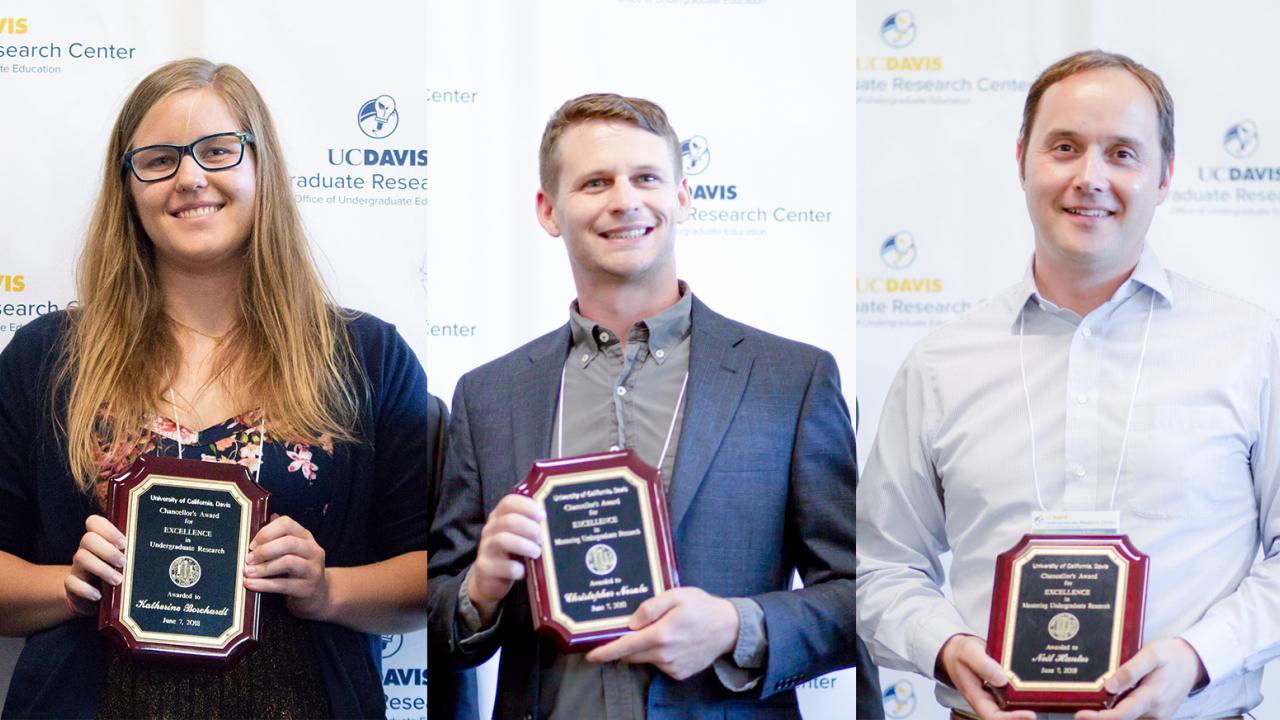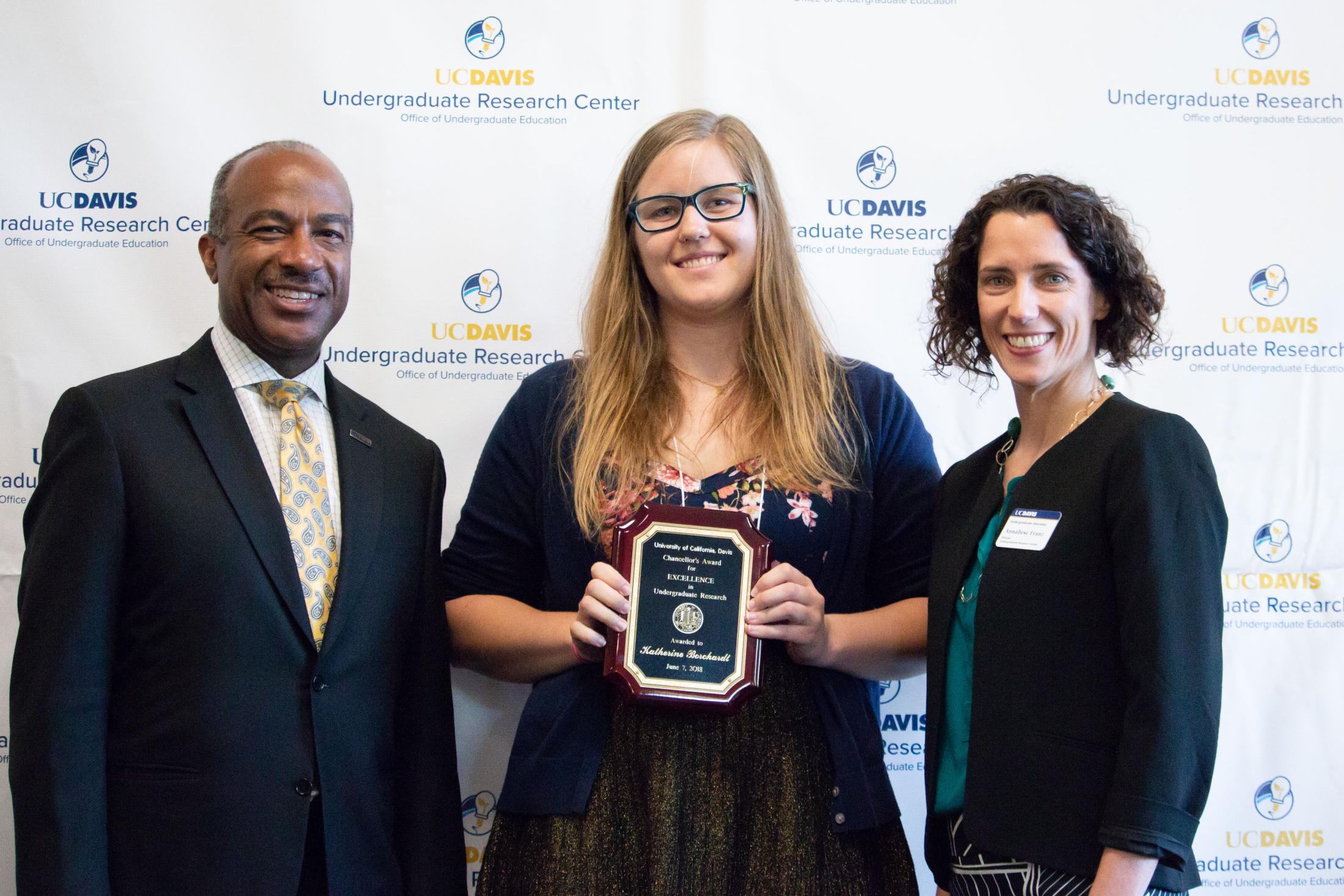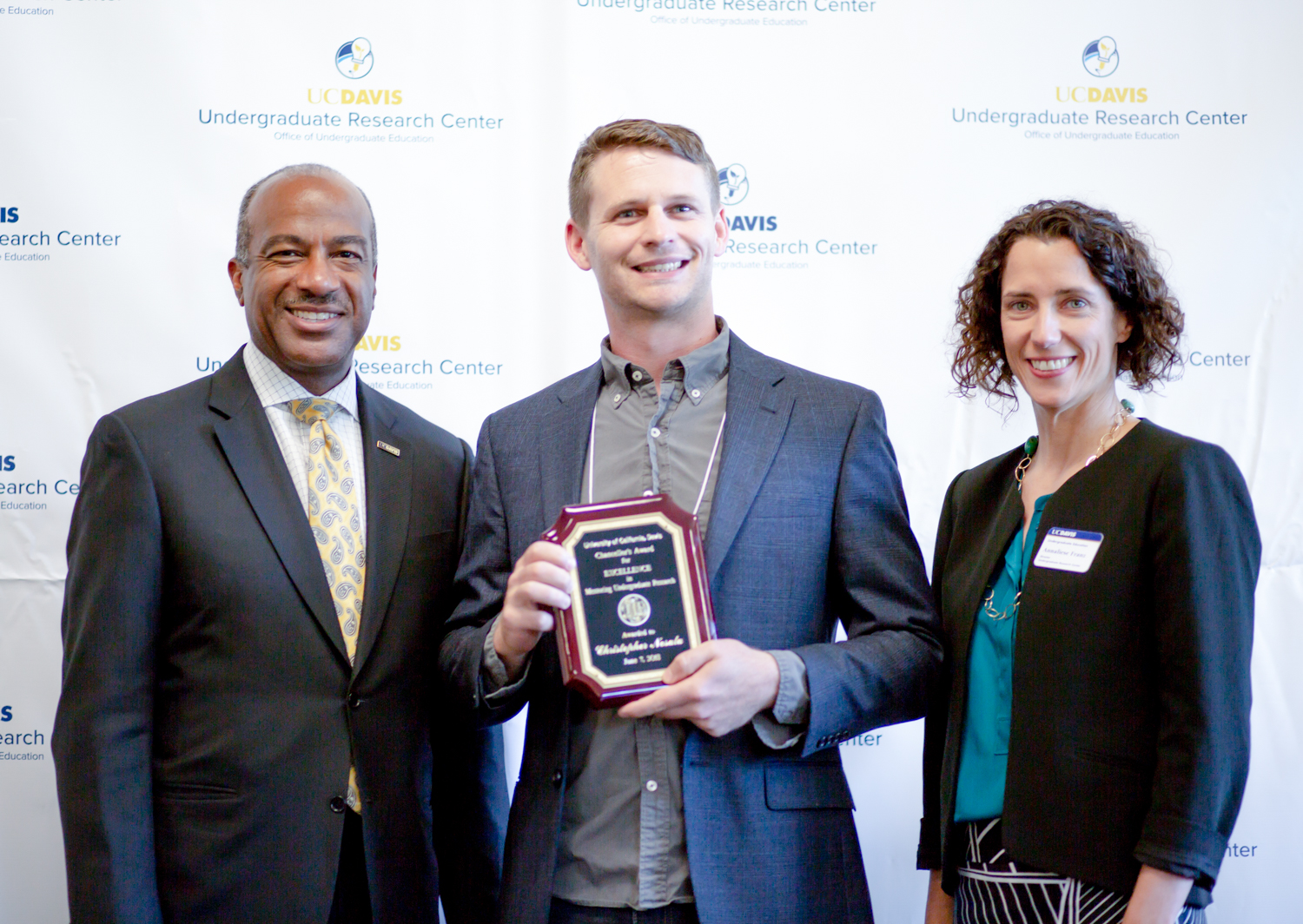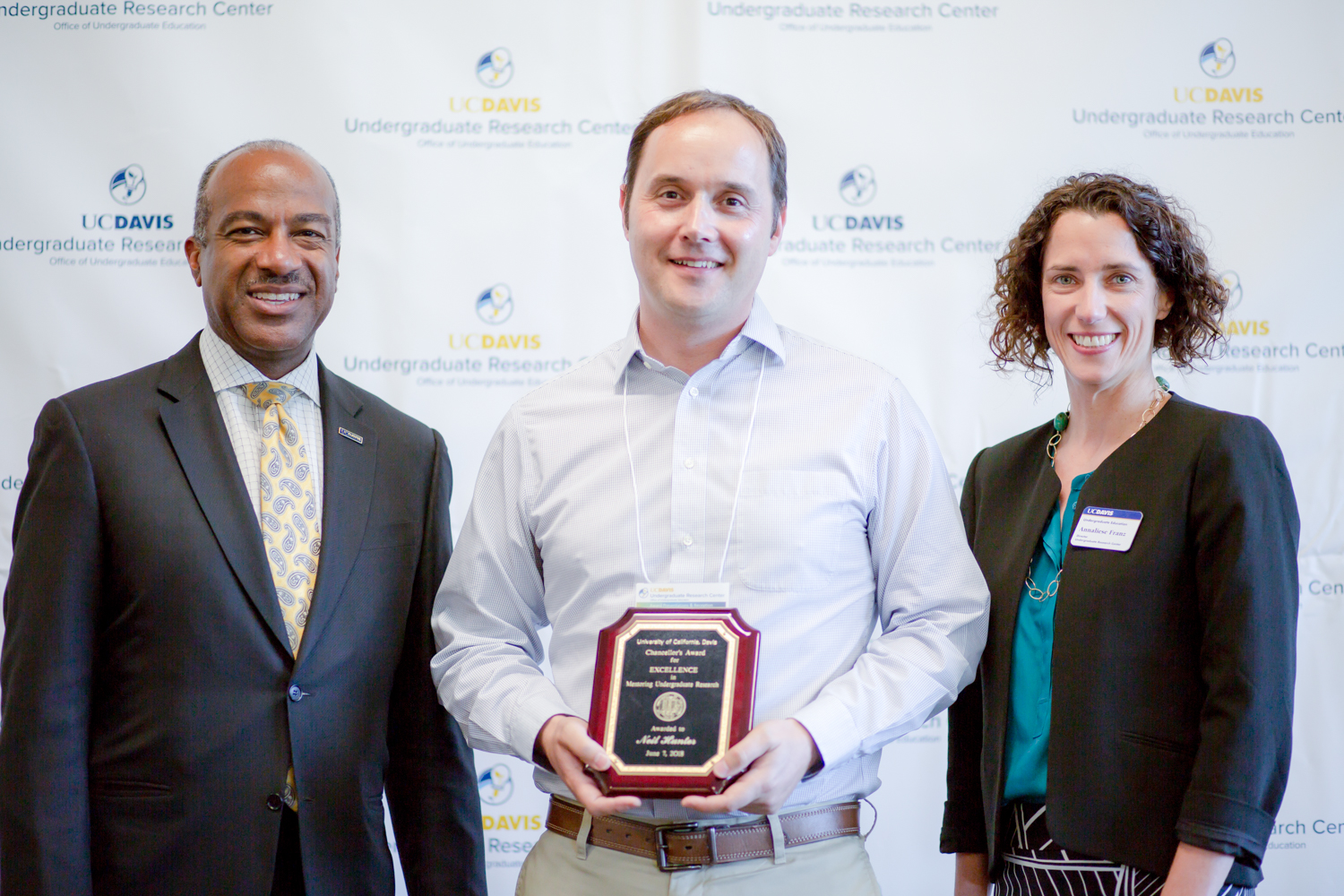
College of Biological Sciences Students, Faculty Honored with Chancellor’s Awards for Excellence
Quick Summary
- Kate Borchardt studies pollination ecology in the lab of Assistant Professor Neal Williams, Department of Entomology and Nematology
- Chris Nosala spent time in Associate Professor Scott Dawson's lab, studying how Giardia wreaks havoc on the gastrointestinal tract
- On top of his meiosis research, Professor Neil Hunter trains between 50 and 60 undergraduats in his lab each year
When it comes to undergraduate research excellence, UC Davis students are primed for the rigor and discipline necessary to succeed in the STEM world. But science doesn’t occur in a vacuum. Behind each undergraduate success is a mentor, a guiding hand in the classroom or lab.
This year, members of the College of Biological Sciences received three special recognitions: the Chancellor’s Award for Excellence in Undergraduate Research and two Chancellor’s Awards for Excellence in Mentoring Undergraduate Research. Earlier this month, the recipients gathered with UC Davis Chancellor Gary May to receive their awards.
“These award winners represent the best in UC Davis,” said Chancellor Gary S. May. “They not only excel in their fields of research, but their scholarship and mentorship are changing lives and helping create a better tomorrow for all.”

Chancellor’s Award for Excellence in Undergraduate Research: Kate Borchardt
Since elementary school, Kate Borchardt knew she wanted to be a biologist. The Clovis, Calif. native spent her youth volunteering at a wildlife rehabilitation clinic, observing interactions between plants, animals and humans.
“I like puzzles,” said Borchardt, an evolution, ecology and biodiversity major and graduating senior. “And an ecosystem is a puzzle of interactions.”
For her research scholarship, Borchardt was recognized with the Chancellor’s Award for Excellence in Undergraduate Research.
At UC Davis, Borchardt joined the lab of Assistant Professor Neal Williams, Department of Entomology and Nematology, whose research focuses on pollination ecology. She was assigned to a research project at the Harry H. Laidlaw Jr. Honey Bee Research Facility, the largest and most comprehensive state-supported apiculture facility in North America.
“Great researchers have a combination of creativity to tackle questions in new ways and the perseverance to get to the answers,” said Williams. “Kate beautifully combines the two.”
In her research project, Borchardt investigated how the makeup of neighboring flowering plants affect native bee visitations to a central wildflower plant.
“Do the neighboring plants influence how many pollinators visit a central plant? Do neighbors affect pollinator interactions? And then also, what are pollinators doing? How do they forage? What is their behavior?” said Borchardt, rattling off a few of her project’s questions.
Borchardt presented her preliminary findings at this year’s Undergraduate Research Conference. She found that neighboring flowers appear to influence generalist-foraging bees, which visit multiple plants and aren’t picky. According to Borchardt, they seem to visit whatever plant order has the most floral resources at a given time. However specialist-foraging bees, which have evolved relationships with specific plant species, were negligibly influenced neighboring plants.
“It feels great to be recognized for my research,” Borchardt said.
Borchardt will continue working in Williams’ lab while applying to graduate school.

Chancellor’s Award for Excellence in Mentoring Undergraduate Research: Chris Nosala
If you’re a backpacker, you’ve probably been warned to filter lake and stream water before taking a drink. That’s because parasites like Giardia can wreak havoc on the gastrointestinal tract.
“It’s a big problem in developing countries, where water sanitation isn’t so great,” said Chris Nosala, a microbiology Ph.D. student. “In some communities, children will get it every year, and it’s associated with malnutrition.”
“Even though it doesn’t kill people, it’s a seriously neglected disease,” he added.
Nosala uses Giardia as a model for cell biology in the lab of Associate Professor Scott Dawson, Department of Microbiology and Molecular Genetics. For his support of the lab’s undergraduate researchers, Nosala was awarded the Chancellor’s Award for Excellence in Mentoring Undergraduate Research.
“To anyone, it is more than obvious that Chris is an exemplary, innovative and exuberant scientist,” said Dawson. “Yet he is also a great teacher and mentor.”
Nosala said his philosophy behind mentoring undergraduates was heavily inspired by the professors he met while attending California State University, Northridge.
“I’m the first person in my family to ever go to college,” he said, noting the college experience was initially unfamiliar. Yet, he met encouraging mentors who helped him grow as a scientist without being overbearing. Nosala adopted this approach with his own mentees.
“For me, it’s about feeling like we’re on the same team and not like a mentee works for me or anything like that,” Nosala said.
According to Dawson, Nosala was instrumental in developing a new method to visualize Giardia in living organisms, successfully imaging bioluminescent Giardia parasites in mice.
“He continued to develop and to teach these methods to members of my laboratory and to undergraduate researchers,” Dawson said.
When a host is infected with Giardia, the parasite attaches to the walls of the host’s intestine by creating a suction cup-like structure called the ventral disk.
“It can attach essentially to any surface—Teflon-coated, polyethylene glycol-coated,” said Nosala. “Giardia doesn’t care about the chemical treatment of the surface.”
Nosala found that Giardia’s ventral disk comprises different proteins that are responsible for moving different parts of the disk structure. “It can generate negative pressure, and then it moves these parts to create a seal essentially,” he said.
With his time at UC Davis wrapping up, Nosala is readying for his next endeavor. Following graduation, he’ll head to Indiana University to work as a postdoctoral researcher in the lab of Associate Professor Ke Hu, Department of Biology, and will study the parasite Toxoplasma gondii.

Chancellor’s Award for Excellence in Mentoring Undergraduate Research: Neil Hunter
Labs at UC Davis aren’t just sites for advancing discovery; they’re research classrooms, where students learn first-hand how the scientific process takes shape. Each year, Professor Neil Hunter trains between 50 and 60 undergraduate students in his lab.
“My primary philosophy is to provide research opportunities to as many motivated students as possible,” said Hunter, who holds an appointment in the Department of Microbiology and Molecular Genetics. “My goal is that by the time they leave, our students achieve an understanding and appreciation of the empirical scientific process that will stay with them throughout their lives.”
For his efforts, Hunter was honored with the Chancellor’s Award for Excellence in Mentoring Undergraduate Research.
Research in the Hunter Lab explores meiosis, the process which creates gametes, or sperm and eggs, in humans. One of the lab’s goals is to understand how each gamete cell obtains precisely one full set of chromosomes and what causes errors during this process, which has implications for infertility, pregnancy miscarriage and human genetic disorders.
“Our undergraduate researchers work in a variety of systems—yeast and mouse, genetics, biochemistry and cell biology—to explore the fundamental mechanisms that underlie meiosis,” said Hunter.
Despite the large number of lab members, Hunter makes time for each student.
“He demonstrates a commitment to the quality of his undergraduates’ research by communicating with and guiding each individual student efficiently,” said Hunter’s former student, UC Davis graduate and 2017 University Medalist, Srujan Kopparapu.
Kopparapu spent three years in the Hunter Lab, which he called the highlight of his undergraduate experience.
“When I sent my poster presentations and thesis to him for feedback and approval, he rapidly returned them within days with extensive feedback, edits and advice for improvement,” Kopparapu said. “This helped me understand how best to pictorially represent scientific data as well as appropriately communicate scientific ideas academically.”
Hunter recognized how important undergraduate students are to his lab.
“Never underestimate UC Davis undergraduate students,” he said. “The reason we can accommodate so many is because they are really great! And having a large group of peers in the lab is very motivating for our students. They also support and teach each other.”